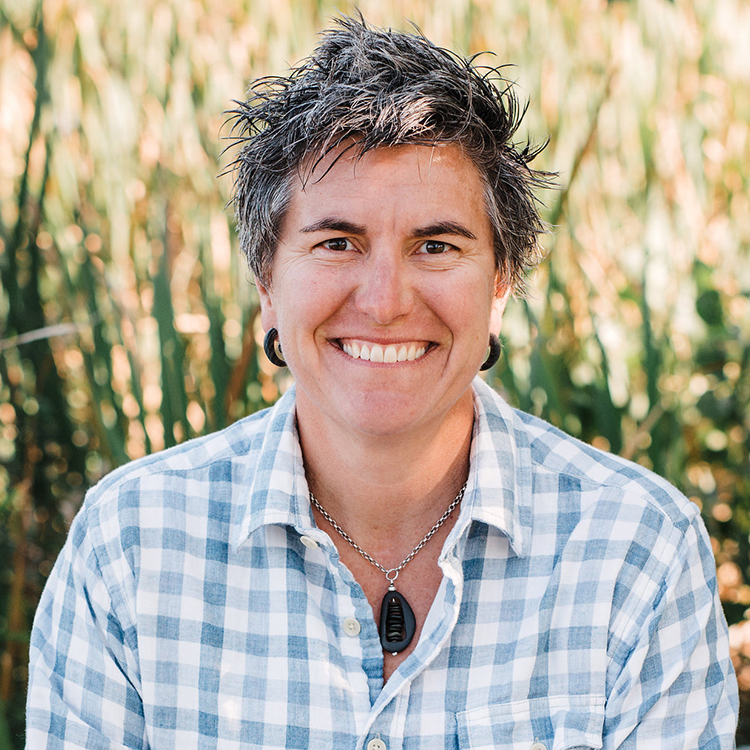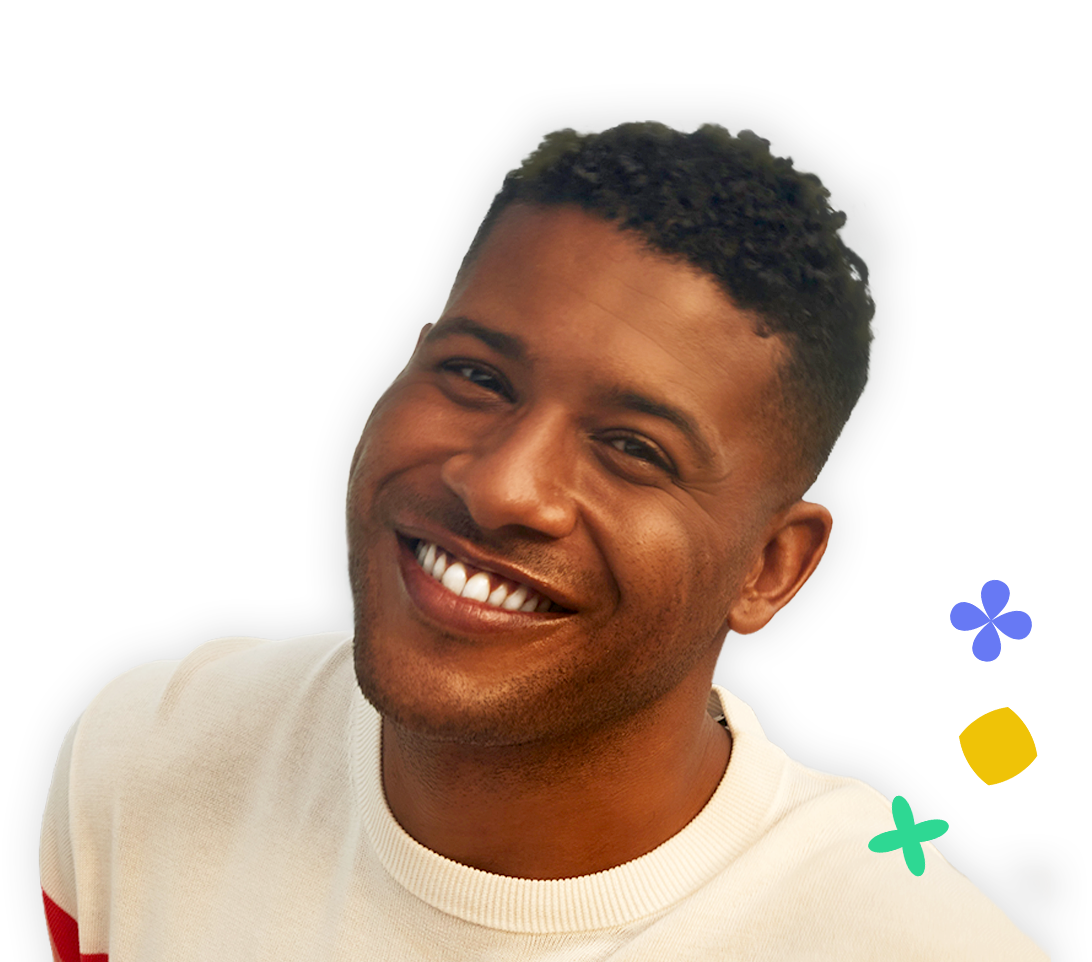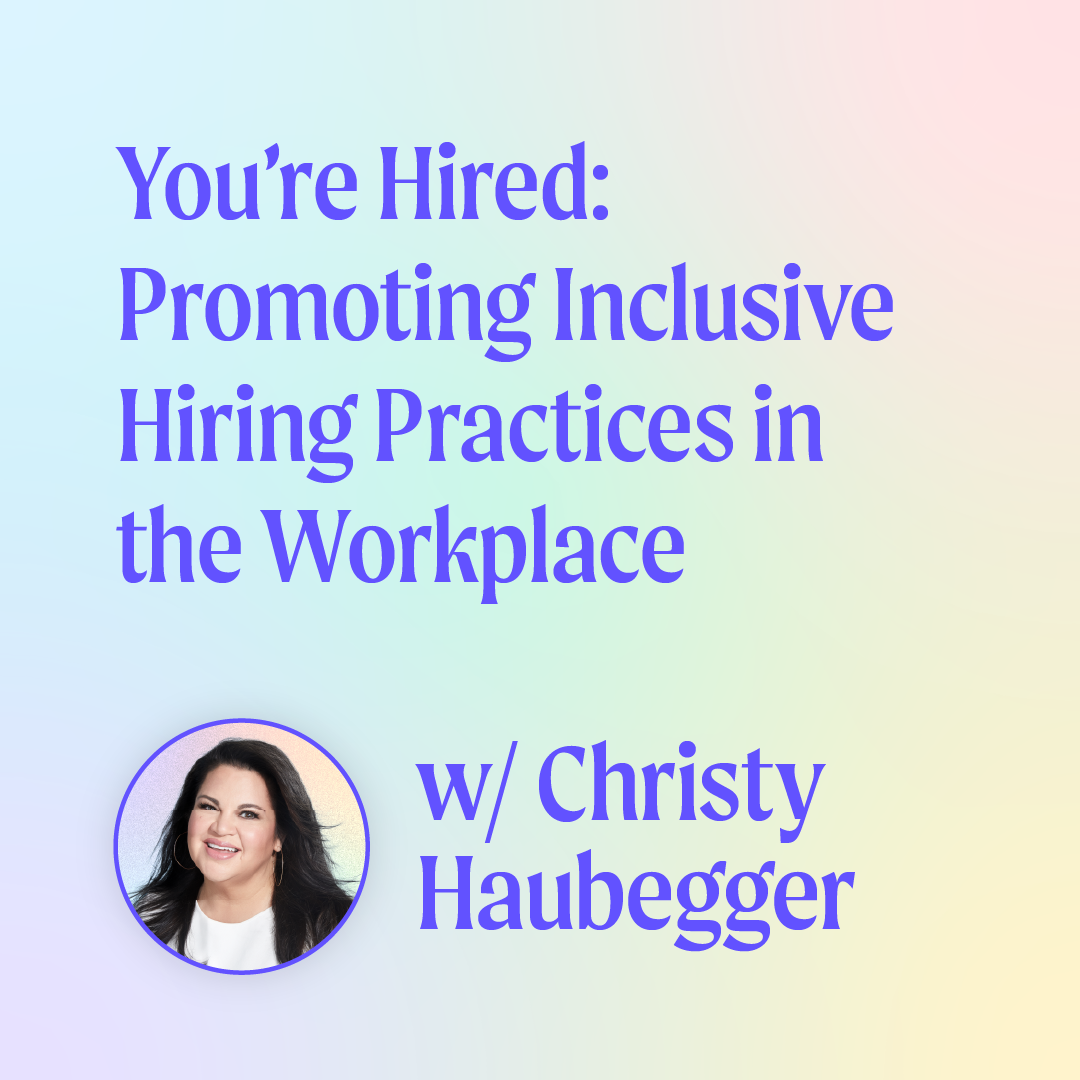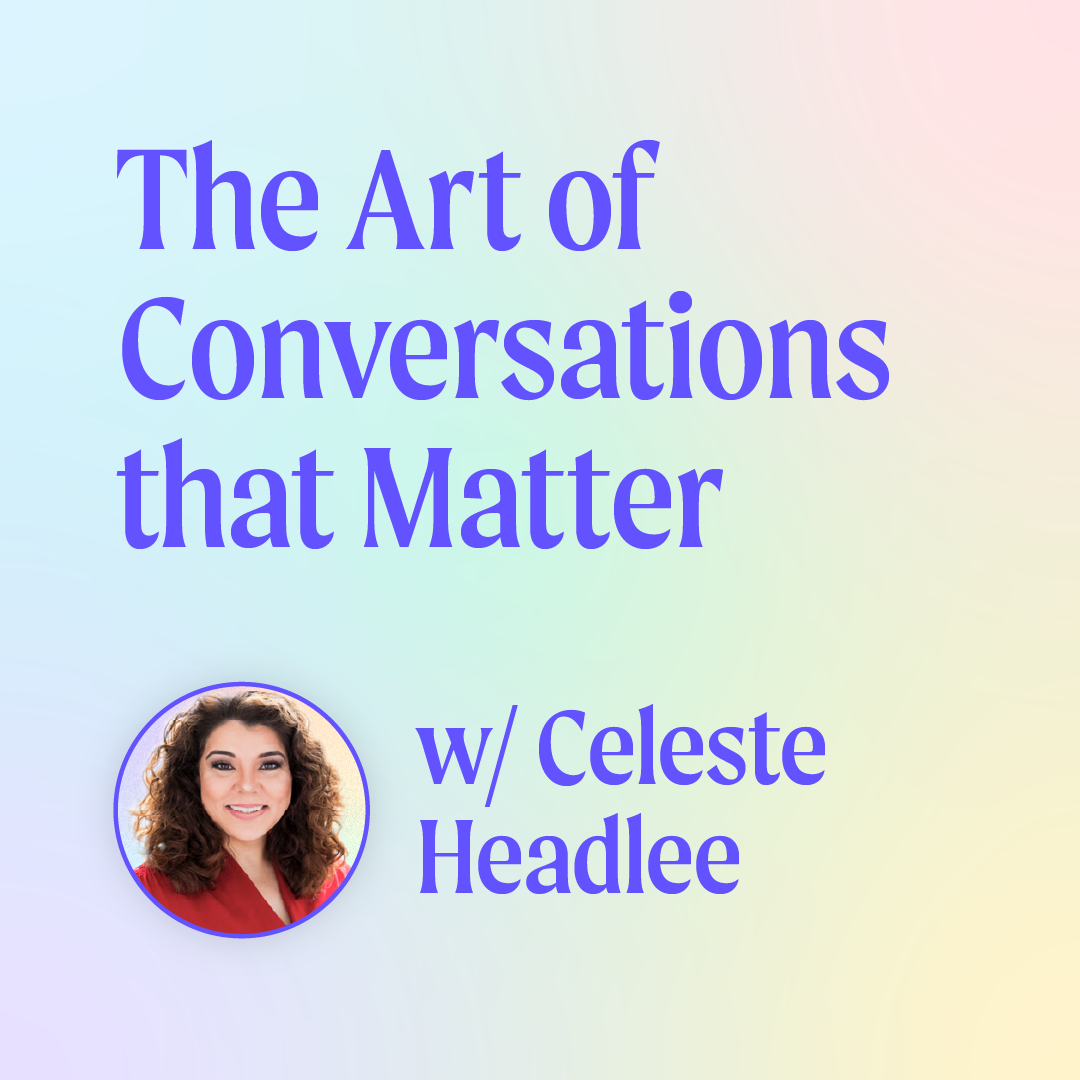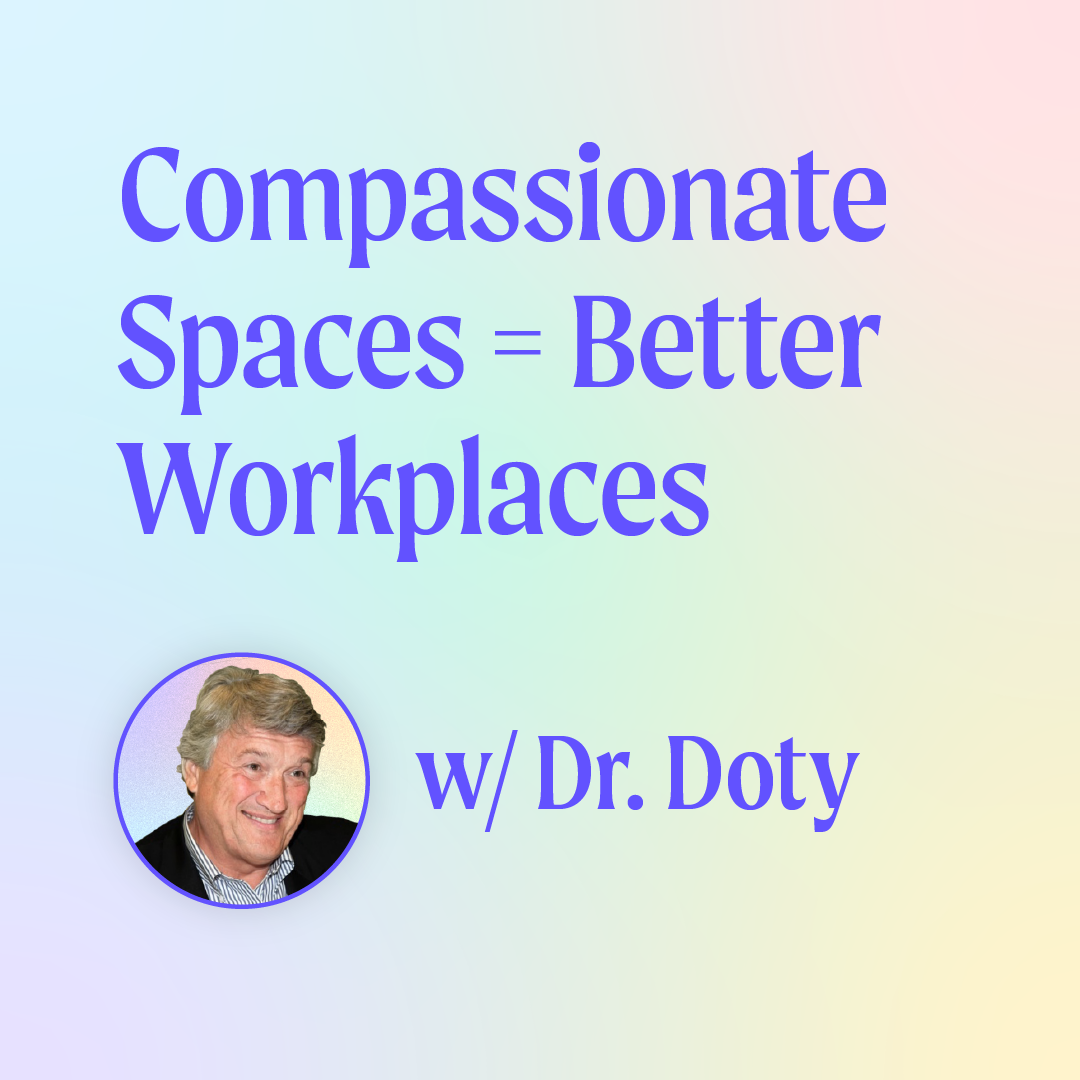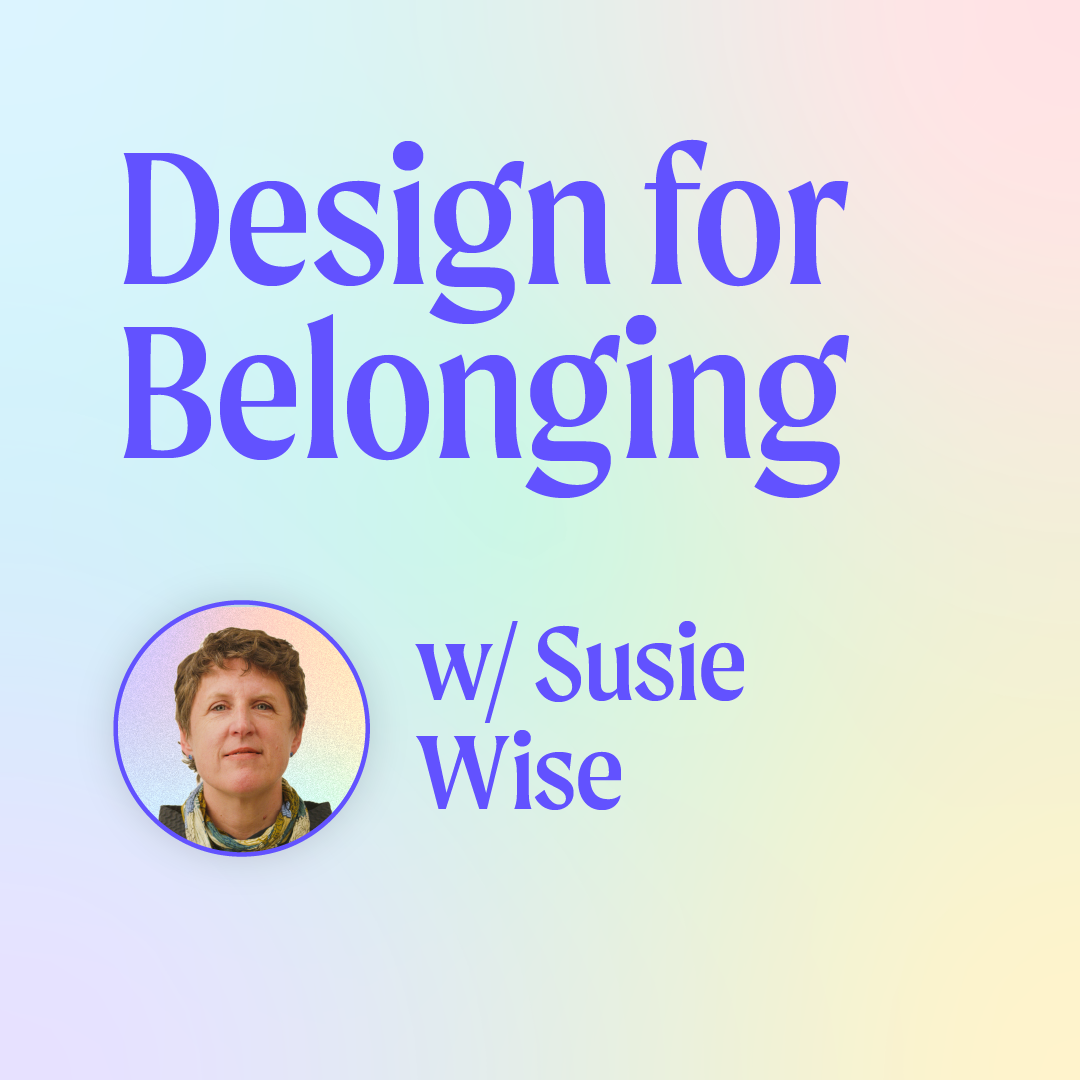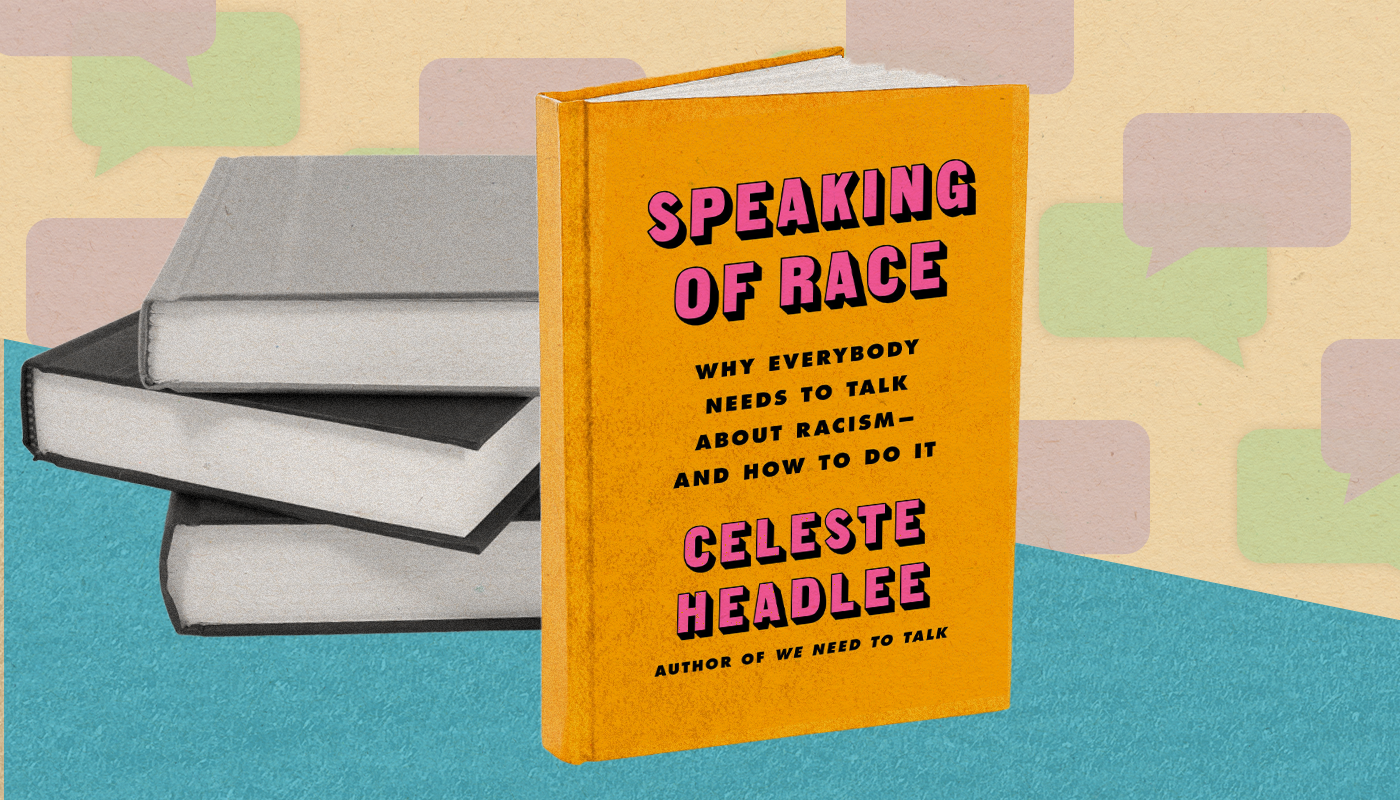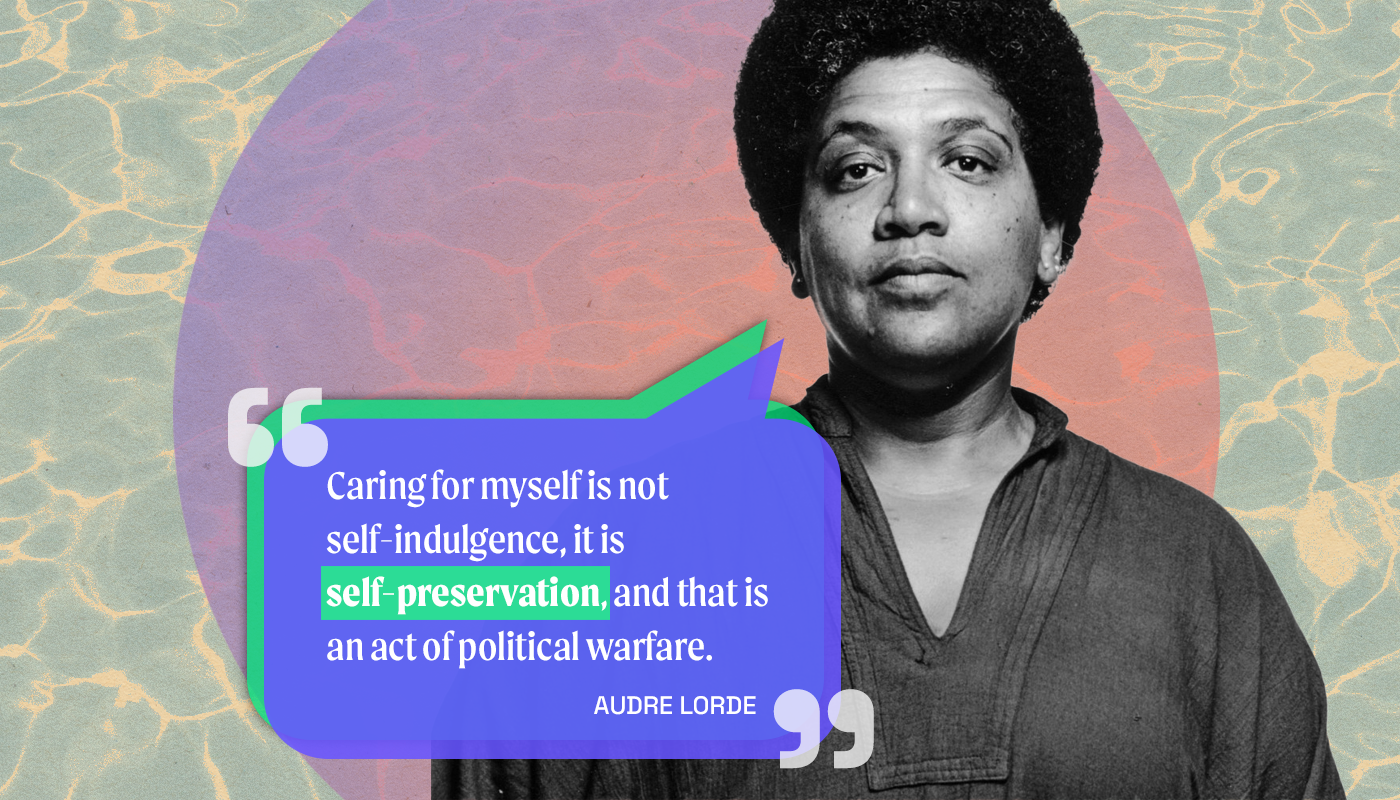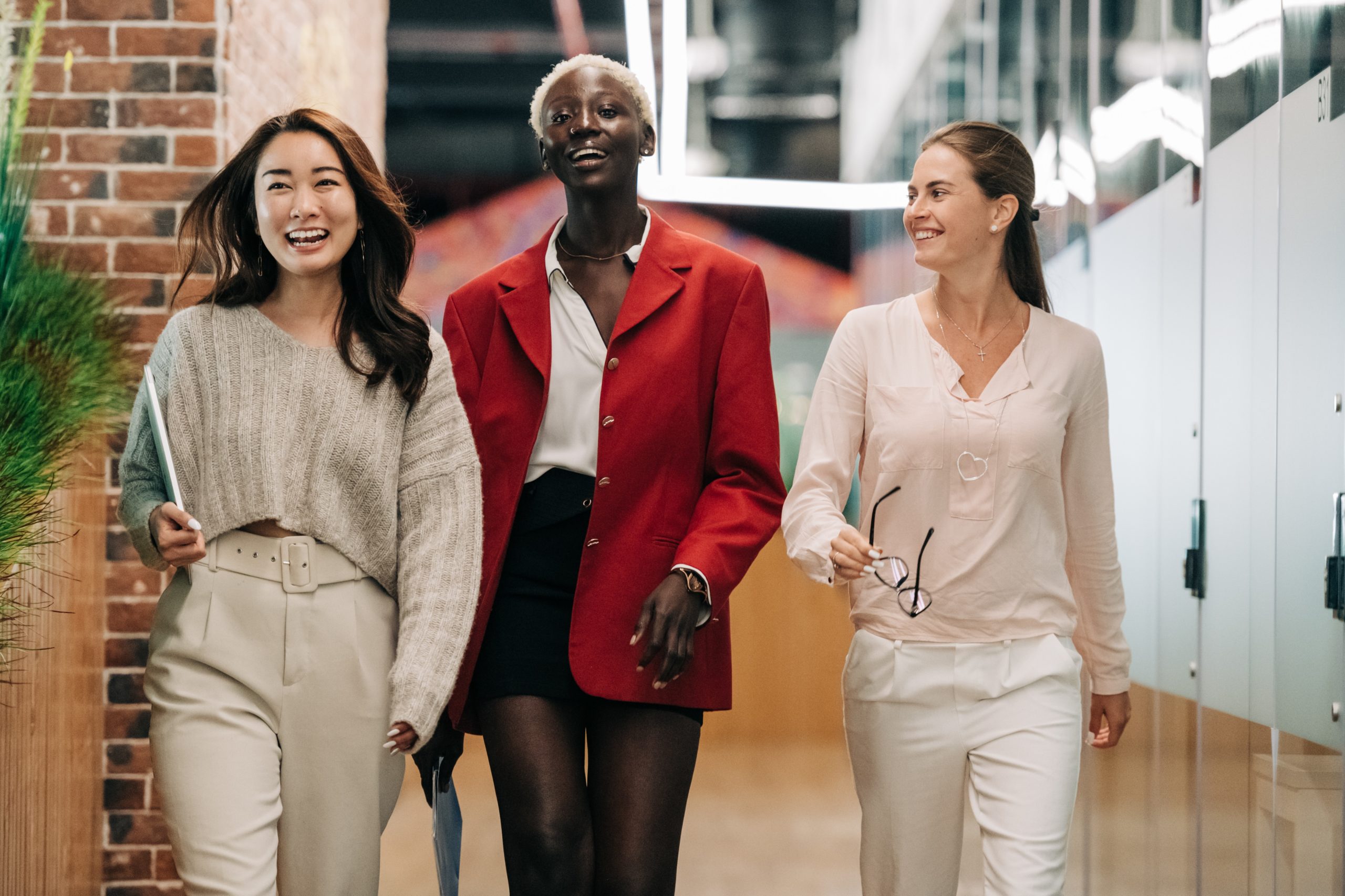Leading with Empathy and Kindness
Episode Description
With many workplaces shifting to fully remote or hybrid settings, it’s more important than ever to build strong, connected teams. It’s no secret that we can accomplish more working together than we can apart, no matter the industry or role you find yourself in. On this episode, Jeffrey sits down with Ash Beckham to discuss embracing a different vision of leadership to create change within our communities.
On Air With
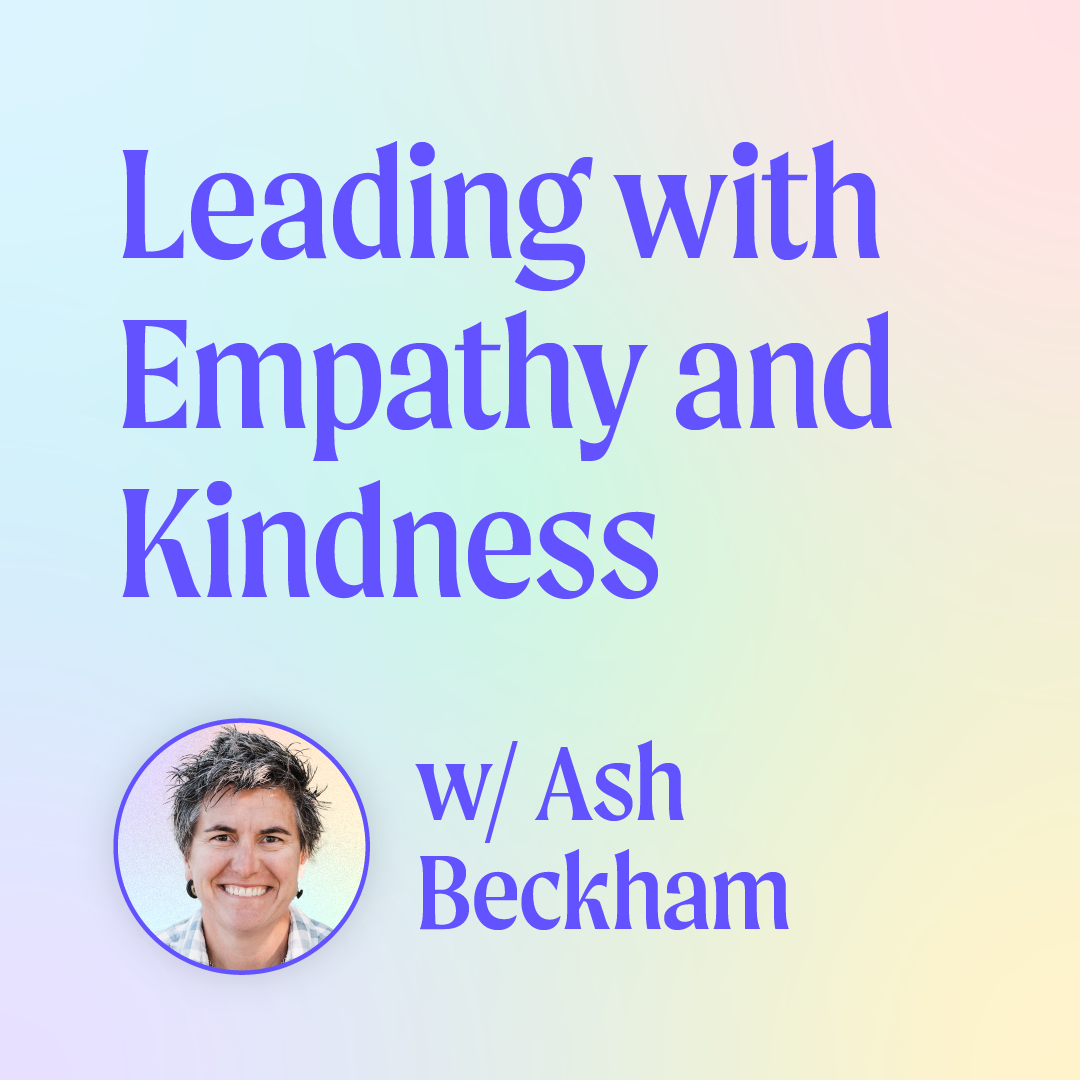
Episode Transcript
While IncludrPod is audio-based content, we’ve also transcribed each episode so everyone can enjoy the series. If you can choose, we recommend listening to the audio, which may include emotion and emphasis that cannot be captured on a page. Transcripts are generated using a combination of speech recognition software and human transcribers and may contain errors. Please check the corresponding audio before quoting in print.
Jeffrey [00:00:02] This is IncludrPod, a podcast that explores inclusivity, diversity and how to find common ground with just about anyone all through a scientific lens. I’m your host, Jeffrey Bowyer-Chapman. I’m an actor, podcaster, model and guest judge on the hit TV series RuPaul’s Drag Race. As a Black queer man, I know firsthand that with deep inclusion and acceptance from others, I can show up not only as my best self but as my whole self. Creating a safe space is the foundation of authenticity. And everyone is welcome here. Welcome to the IncludrPod.
Speaker 2 [00:00:50] No matter how successful I’ve become in my career, I’ll never get over the firing that happened to me 30 years ago when I had been the creator of a very successful children’s television show. But the head of the production company decided that because I was gay, he did not want me in that position anymore. So no matter what any of the executives at the network felt, no matter what any of my colleagues felt, this man was able to manipulate the situation so that I was out of the picture and I had no recourse.
Speaker 3 [00:01:31] As the director of development for a small production company, as a woman interestingly enough, the owner of the business often praised me and considered himself a feminist and talked often about how he loved that he had two women working at the company, myself and a producer who was extremely amazing at her job. But then when push comes to shove, very, very basic, bottom level respect would go out the window. For example, if we had a very high profile client, particularly if that client was male, he would forget to introduce us. And when myself and this producer would enter a room with an important client, even if I myself built the relationship or reached out to this person, he wouldn’t always introduce us with our name and title. We would just be these two women standing in the room sort of uncomfortably waiting for the right moment to introduce ourselves. And I found that to be extremely discouraging and problematic. And there was a primary reason that I ended up leaving that company.
Jeffrey [00:02:34] With many workplaces shifting to fully remote or hybrid settings, it’s more important than ever to build strong connected teams. It’s no secret that we can accomplish more working together than we can apart, no matter the industry or role you find yourself in. Giving everyone on the team a chance to offer their perspective and share their unique experiences ultimately increases the success and productivity levels, giving meaning to the term ROI or as some like to call it, return on inclusion. But what are the secrets to building a team that not only accepts and supports one another but that also champions inclusivity and celebrates our differences? And more fundamentally, how can we define the word team in the first place? Given the complexities of today’s world is a team a space where collaboration can take place freely? Is it the pursuit of a shared goal? Is it finding common ground through lived experiences or something else entirely? Today’s guest Ash Beckham is an inclusion activist, inclusive leadership expert, motivational speaker, business leader and the author of Step Up: How to Live with Courage and Become an Everyday Leader. Known for her unique voice, relatable style and powerful guidance, Ash’s TEDx’s talk coming out of your closet quickly became a viral sensation. A popular speaker and leadership educator, she frequently addresses topics including embracing a different vision of leadership to create change in our workplaces, schools, places of worship communities and more. So to kick it off. I’m wondering if you can share a bit about your background in your career so far.
Ash [00:04:09] Unexpected, I feel like is the best way to say it. My parents are both entrepreneurs. And I felt really lucky to grow up in that environment. But like any 18 year old, I swore I would never do that. I wanted like the corporate office and the 401K and like all this security, I don’t know why. Just like, what your parents didn’t give you? I guess? I don’t know. I had an amazing life. In retrospect, I was just an angsty, closeted 18 year old. I think so. So I decided, you know, that’s what I want. I want the whole shebang in that kind of that corporate structure and then kind of got started working a little bit. And I had a job beyond just like any service industry job had had, like my first real job and I lasted about 12 months. I was like, I don’t like working for other people. So I kind of pursued this track of trying a bunch of different things right and eventually got to a point where I kind of put it together and had some breathing room and realized I hadn’t done anything creative in a really long time. And went to a talk, you probably have them in L.A. called Ignite. And so you get five minutes, slides, auto advance every 15 seconds. And I went to one of those and, you know, like a live performance and it just, you know, community events seemed really cool. And there’s this guy that spoke about his ups and downs with weight loss. And there’s like something about this guy and his authenticity and the fact that he wasn’t a professional and his honesty that just inspired. I was like, Oh, I want to create that feeling in other people. That sense of like a serious topic that you could make funny and also people don’t feel alone like, I just love that feeling. So the next time it came up, I signed up for it and got lucky enough to get picked in and did my first talking. And then all of a sudden it caught traction right and half a million people saw it. And I was like, oh, that was that wasn’t my plan, right? That’s so I was trying to do. So that was like February of 2013. And then that fall was when TEDxBoulder was in a small community of speakers here and incredible coaching and, you know, encouragement and prodding and all the things it takes to make you do something scary. I shared that story and then that kind of catapulted me into this, into this speaking world that I wasn’t ready for but the way that it resonated and the honesty of the story and and the difference I thought I was making, you know, you just kind of you keep going and kind of overcome your fear because it’s kind of bigger than you. And so that’s that’s kind of how it got started. And that was, you know, whatever that is like eight, nine years ago. And so it’s been a career path. One was still one of the many I still like to tap my fingers in lots of parts, but still on that I do pretty, pretty regularly and consistently. And it feels super, super honored to be able to practice that work.
Jeffrey [00:06:47] So this is what you mean when you refer to yourself as the accidental advocate then. So it was hearing that man’s story of authenticity about weight loss that inspired you to do the same. I didn’t realize that your TEDx talk coming out of the closet was your first public speaking gig. That’s hugely impressive. I mean, what a way to kick it off, to get up there and share this vulnerable side of yourself and your life’s experience and for it to go viral in the way that it did. How did that affect you personally? How did that make you feel?
Ash [00:07:16] I mean, was just kind of in shock. I mean, I remember working with a good friend of mine, one of the kind of launching pads for going beyond, you know, just being shared on Facebook has been on Upworthy.com and a friend of mine was like when I published this, you know, I just wanna make sure you’re ready. And I was like, I don’t I’m not I’m not sure what that means, you know, they’re like, Well, you need to like get a Twitter handle with your name. Like you need people are going to want to contact you. Like by your name is url Like, This is could be big. And I was like, Oh, you know, I didn’t know what I was. I had no idea what I was doing. And then I think you go through a phase. And I remember being as my sister was in Chicago at the time and going to visit for a friend’s wedding and being on the L and somebody like looking at me, looking at their phone, looking at me and being like, Is that you? On my Facebook page? It was so bizarre. And then you get to a point where you think everybody recognizes you, say I got a little a little arrogant and I think I lost my humility and kind of kind of thought I was a bigger deal than I was. And so then that brings it back down to Earth. But I do have friends and family who have been so supportive but also, you know, it doesn’t it doesn’t change what you do. And that’s kind of the reason I like having my hands on a couple of different pots is because I would go from, like speaking in an auditorium with 1500 people to, you know, going to work events. And so then like driving a forklift and like, nobody really cares what your TEDx view numbers are, like just put the thing in the right spot and doing anything about it, right? So. So if you like that, you know, I feel like that’s just always been important to me to maintain that. So I think it was pendulous in the beginning. Just because you don’t, you know, I just don’t know what’s going to happen. How quickly is it going to be over? Is it really resonating? I mean, there’s certainly an overwhelmingly positive response but some negative responses. And you know, those hit deeper. It’s hard because you are your brand, you know, it’s personal. And so it’s hard to detach that but also for your own sanity and humility and all of the things that matter, like you just kind of have to it’s it’s a weird feeling for it to be you. But then is it, you know, I don’t know how do you maintain that authenticity throughout that? It’s a challenge.
Jeffrey [00:09:18] I completely can relate to that. It’s funny in talking about authenticity and vulnerability. It’s so vulnerable of you to be able to acknowledge and state here, so matter of factly that your ego really did get the best of you at a certain point thinking that you were bigger than you actually were, which I think so many of us can relate to. And in moments like that. What was it about speaking and writing about empathy and respect? Why did you decide to step into that? Like, why was that your focus from the get go?
Ash [00:09:46] Yeah. Well, I think it’s all about having these continuing conversations, right? I mean, I think I went through. For me, there is kind of this arc of of advocacy that went from, you know, not necessarily public advocacy but personally advocating for myself that, you know, you don’t have your voice for so long and then you find your voice and then in and then then you have to balance like scaling it back, right? And I think once you’ve been quiet for so long or been meek for so long or felt like you didn’t have a place to speak for so long and then you do, it’s hard to reel that back in. But then you get this perspective of like, what difference do I actually want to make that it isn’t this very reactive space but it’s an intentional space is like, what is the change that I want to see happen in, you know, is like soapbox scene and yelling at people the change that I want to make and that, you know, certainly there’s times that I think that that’s important. But for me to most effectively make change, it was about softening rather than hardening. Part of that hardening, I think, is from self-protection. Like, that’s what we do, right? If we’re going to put ourselves out there, it’s going to come back right and so you got to be ready for it. But that isn’t just it’s just isn’t engaging. You know, I didn’t want them to think differently about me because I was gay. I wanted them to think differently about gay people because now they knew one. But the only way we’re going to do that is to have a conversation because people have their preconceived notions about so many things that it’s about a conversation. So, you know, it’s kind of it was on me to meet them where they were and try to talk through that. And I think the only way you can get there is is through empathy and and respect. And that’s the thing I feel like that’s so great about empathy is different than sympathy that you don’t have to agree with someone to be empathetic with them. All you have to do is be willing to see it from their lens. And at that point, you can have a conversation with nearly anyone, right? If you have no no intention to change their mind and you’re secure enough in your beliefs that that they’re not going to change yours but you’re open to that, like you’re just open to growth and conversation, you can you can literally talk to anybody.
Jeffrey [00:11:48] You know, I think that’s something that so many queer people can can relate to, and you’ve really stepped up to the plate as a leader in this space. I think that people are often stunned and amazed at others, meaning women or people of color or trans folk or queer folk, or whatever it may be having the boldness and audacity to stand in authenticity and speak truth to power. Has this confidence and courage always been ingrained in who you are? And if not, I guess I’m curious to know what tools and what people and what experiences along the way shaped you into the bold leader you are today.
Ash [00:12:25] Yeah, I mean, I think it was there to a certain extent. And I think I was when I was young, right? You kind of you don’t know the consequences but I think I was always, you know, a little bit of a ham like to get up in front of people. But then something externally that then gets internalized stops you right? All of a sudden, that authenticity doesn’t fly anymore and we’re fit in these boxes and we’re doing what we’re supposed to do and we’re crushing on who we’re supposed to crush on. And girl, so many times minimize ourselves, right? And there’s this like, need to blend in. And as a kid that never wanted to. But then, like for social survival, felt the need to, that it’s really hard to get back out because, you know, not only do you think that there are those people that are telling you these forces externally there that are telling you to quiet down, you don’t believe enough in yourself, right? There is a part of you that says, Who the hell do you think you are? Your voice hasn’t mattered for so long. You’ve just been going along. Like, Why does it? Why does it matter now? Like, for me, it was like coming out the first time, and I remember being so angry, like coming out and then being so angry at my friends that weren’t like out in their everyday lives. And just like feeling kind of like this elitist view of them, like, why would you do that? Like be stronger. And then you think about it and you’re like, Whoa, whoa. That’s it. That is everybody’s journey. Like the internal struggles, the external struggles, the families, like everything that’s going to come with that, everybody’s on their own path. And also, I was there three months ago, right? Like, I would never want to go back in the closet. So then I had this feeling of like, What if I am out, then I have a responsibility for all, to all the people that can’t be to speak. Like if I had, if I have it and I have the voice and the confidence and the privilege of my whiteness and the privilege of my gender identity and the privilege of my ability. Right. Like, let’s not pretend that just because I’m a lesbian that I’m at the bottom of the totem pole, right? Like, I have plenty of privilege and to use that in a powerful way to make someone else feel not alone. To me, that is that is the responsibility of leadership.
Jeffrey [00:14:38] Did you have those examples in your parents as entrepreneurs? Did you see them as leaders?
Ash [00:14:42] They did. You know, you see, like, you know, we all have our things with challenges with our parents and like how you see them. But for me, it like took a while to step back and kind of get out of my parents’ house and see that. I mean, they always adored me and they were amazing parents. But I remember seeing my mom for the first time. She owned a retail store and somebody walked in and it was a maternity store and this woman walked in and was, you know, super uncomfortable. And and I remember my mom like somehow the way my mom talked to this woman of like, Oh, you must be a size four or whatever. And this woman was not a size four. But she like my mom’s ability to relate to this woman with where she was and like, give her that confidence, like the way she makes people feel is so amazing. And so that, you know, you like, see that and you’re like that treatment of people. And my dad was like, always a creative entrepreneur, always the one, always like the new thing than, you know. And it was always fun right here. And like video game rooms in the 80s, it was it was like, did what he loved you on an ice cream shop because he loved ice cream. Like, that’s kind of what he did and also worked tremendously. You know, at the end of the day, I feel like they must have looked at them. I hope they looked at themselves in the mirror and been like, I’m a good person. They were just good people. It’s just like a confidence in what? What does it mean to be a good person? And then by default, you’re a leader like people wanted to follow them because they were good people, like my dad was a great coach. You want to play for him because he was just a good guy. Like, I think that that’s that whole leadership, not by how many people report you or what your title is or what the size of your budget line is, right? It’s like, who are you today right now? Who are you at church? Who are you at the park? Who were you in the office? Right? Like all of those things, but like, who are you day after day, day in, day out and not in these like monumental things in these like small incremental ways like who are you when people aren’t looking, right?
Jeffrey [00:16:45] Oh, that is good. You just got me there. Who are you? They’re my three favorite questions in the world, but who are you when people aren’t looking? So I know that for myself as a bi racial queer person, that my perceived otherness has affected nearly every space I’ve entered into since puberty. And we know that the world looks at us and delegates us into a different category than the status quo because of our sexual identification. Having this advantage of this different vantage point, how do you think your sexuality has affected your perspective on leadership?
Ash [00:17:20] I think you have a very acute awareness of what it feels like to be included, the you know, how critical those non-verbal cues are. It is this innocent declaration of allyship and safe space ness and to know to verbalize that I think is critical. It’s like the same reason it when you’re going through a job interview and somebody asks you pronouns like it’s to make the people who choose nontraditional pronouns or pronouns that they wouldn’t be assigned based on their sex at birth. But really, it’s about straight cis people too because it makes you really know how important that is to the organization. So I think it’s it’s all about those cues of safety. It’s about the language that you choose. So I think coming up, you know what it feels like pre marriage equality for the company emailed to say spouse and you’ll be like, wow, I mean, that’s like how we consider it right? Like, if there’s not a box to check, you have to draw a box. So your job as leaders to make sure there’s as many boxes as we need or we just get rid of boxes. And you we have our own blind spots, right? Like we have the places that we can’t see. That’s why this is a constantly growing, constantly changing in what LGBTQ identities are, in racial identities, in other challenges, right? That we always have to know. We’re always leaving somebody behind. So how does that inclusive view become 360? Like, how are we always making sure we’re moving forward? But there isn’t anybody that’s excluded, and to me, the vulnerability comes into play there in a leadership role in going to your team and crowdsourcing that information, right? It’s not your job as a leader to have the answers, it’s to be able to find the answers to collectively get to the place where there can be answers. And so how do we make that a team effort? How do we say, Hey, who, Who, who are we excluding in this language? Who do our bathrooms exclude? What is our health plan? Exclude, right? Like, who are we leaving out? We have to be aware of that. And then you create team members who are cognizant of that. So you’re not the only one with your eyes out for it, right? That’s not your job. It’s a create a group of people within your team and my team. I mean, work team, the PTA. I mean, whoever your groups are, your community, right? And so how do we get those people to be just as vigilant about that, to think about their actions and who they’re excluded? Right? Now, I think that that’s that’s kind of this key piece around teams that is so critical.
Jeffrey [00:19:49] Absolutely. I mean, it’s why and how sensitivity and individuality can be viewed as a superpower in these settings. Know it’s so obvious to us as as marginalized individuals stepping into the microcosm of the corporate world or the macrocosm of our society at large. It was, it wasn’t, it wasn’t built for us or for people like us. So it’s so easy for us to identify the fundamental flaws in the foundation when we can recognize that this world was built on a foundation of white supremacy, patriarchy, misogyny, homophobia, transphobia. So when we do enter into these spaces, there’s not an inherent sense of belonging. So I think it’s fair to say that we’ve that we’ve made considerable progress in terms of being more open and accepting of LGBTQIA+ community in workspaces, while simultaneously acknowledging that a tremendous amount of work still needs to be done. What do you think going forward that work needs to look like?
Ash [00:20:50] We know we’re such a new environment now, obviously with its virtual and and what that looks like. And that creates an entire different layer, right? For some people, that makes it so much, so much easier for other people. You’re bringing somebody into your home like much more vulnerable than that, right? How conscious are you of of who walks in or whose voices heard? Or if the dog barks or whatever, right? Like, we’re so conscious of bringing people into our lives like that that is intimate. And so to acknowledge that as as a leader and that some people are either not comfortable or not able to do that. And so creating workspaces where that can actually happen, I think, is super important. But I think we’re always looking through that inclusion lens that we can most effectively have those conversations as a team in this kind of grassroots matter. There’s a policy and then there’s practice and I feel like the policy is getting there. I mean, it used to be like a wink and an arrow. If you work for this company, it’s greater. As long as you’re in the marketing department, you’re fine, right? Like, there were these kind of like queues that existed. But now it’s like, if you’re DEIB now, you know, we’re like always adding things to it, but I feel like that belonging piece. You brought it up, and I think that’s so important. But as a larger corporatization, if corporation, if that is not part of your website, like if that is not searchable, you’re at a competitive disadvantage in your recruiting because it isn’t just about us anymore obviously, it’s about creating a culture of inclusion beyond LGBTQ and now my sister or my street best friend, like that’s on their radar, too, right? If they don’t see it, they might be able to exist in that space. But they know how much diversity positively affects what is produced by an organization and also not saying something is now negative right before it was like, Well, what if you know, we don’t want to alienate people back and you go back forth? And now that just isn’t the case. So I think the policy is there. I think the practice, depending on where you are and what the leadership looks like, may have a long way to go. Right. And I think because we it’s as middle management squeeze, right? You’ve got like sea level folks that get it right. They understand they’re in a place of power and privilege where they’re looking at competitive organizations that work right. I’ve worked with a bunch of banks. And if one bank has a certain DEI policy, it’s really easy to get another bank to adopt it and because they don’t want to be outdone in that space. And then you’ve got the younger generation that’s coming in that that’s what they expect, right? They’ve been queer out since middle school, like they don’t know any other way. And so they have an expectation of that’s what it looks like. And if I’m not applying somewhere where that isn’t the case. But then you’ve got these like myself, 40 something, 50 somethings that are like, What the like? I get it, but how do I apply it? Like, I don’t know. I’m like straight and live on a cul de sac, you know, with my two kids and a dog, and I just happen to be gay and live on a cul de sac with my wife and two kids and a dog, right? Like, we’re we’re all the same. We’re doing the same thing. But like, it’s those middle people that we’re thought, that it wasn’t OK. We don’t talk about race. We don’t talk about these things, right? We just like, go through. And if I say I’m so afraid to say something, I’m going to say the wrong thing. I say nothing, right? And so that’s like who we need to target.
Jeffrey [00:24:10] Individuality is something that’s so important, obviously, to recognize that we as queer people or people of color, whatever are not a monolith. You know, members of the status quo, straight white, cisgender people are not a monolith. What you were just touching on there that so many people have good intentions but don’t necessarily know how to put it into practice. I think that, you know, switching our perspective from individuality to community into into tribes, into teamwork. I think the word team carries multiple meanings today and may take several different forms. Whether you’re a freelancer working on a set as an actor like I am or, you know, meeting with corporate partners or a multitude of other different dynamics. How can we begin to learn to navigate these different settings and expand our perspective of what it means to work in the team setting?
Ash [00:25:00] It’s again, it’s this balance right there. I think so much of it comes from being secure in ourselves, rights being secure that our individuality is paramount, right? That we are part of the team, not despite our individuality, but because of it. And then also being open to the superpowers of others, right to be able to see that, to be to be welcoming. And that, you know, it’s not it’s not a one way street. And so as much as I want to speak my individuality and showcase my individuality and bring that, I have to be willing to see that in other people. To create this welcoming environment, not just by people that agree with me or that are like minded or that vote like I do right, everybody. And then when there is conflict, how do we deal with it in a productive way, right? How do we how do we make sure everybody, not just the loudest person that’s getting heard that everybody has the opportunity to showcase because somebody else’s individuality might be more quiet, may be more introverted, right? Like, how do we navigate that of, you know, it’s not going to fit together? All the pieces of the pie aren’t going to fit together but we can all bring a seat around the table, right? And we can invite more people to the table and we look and see who’s not represented at this table, right? And what can we do to make sure those interests are represented? Doesn’t happen overnight but it starts to happen when people begin to be vulnerable. When I put myself out there, right when when I start to share my story or my perspective or why. Right? We are better as a group because I have traveled a different path than you have to arrive where we are right now. And I’m bringing everything the good, the bad with me here. And the more that I can talk to you about that, the more we can effectively collaborate, right? Because there may be things about you that that I learned that I can then be a better support to you because I know some of the struggles that you have, right? Is there somebody that you’re taking care of in in your life that you need some extra time with, right? Are you going to work different hours because of the restrictions that you have? But if you don’t know if I don’t know that about you, then that how can I be flexible enough to support you?
Jeffrey [00:27:05] I mean, as we touched on earlier, it’s, you know, it’s quite obvious that corporate settings the establishment, as you put it, it wasn’t built for, it was built on a on a on a foundation of exclusion and privilege, essentially. So I think that, you know, mastering leadership, it has so much to do with unlearning the societal norms that have been put in place that we’ve been conditioned to accept since birth. But I guess my question is, do you believe that we as human beings are naturally hard wired to succeed as teammates and leaders? Or is this a practice that we need to learn to nurture consistently over time?
Ash [00:27:41] I mean, I think both, right, like I think we are hardwired, like I think anybody that’s listening to us that is listening to this right now, you are in a position of leadership. It could be a leader of one, right? But you are in a position of leadership. And so it is time that we act like leaders, act like leaders, that we are, that we take the power that we need, the responsibility for who we are in the traditional sense of leadership, right, for unlearning that. There are going to be people that see you as a leader but never tell you that are complete strangers, right? That like when they see you hold the door for somebody, when they see the way that you talk to a stranger on the street, the way you have a conversation with the brew chef of coffee shop like.Just the way you are as a human right. That energy is what we want to see. And so it’s going to be all the ripple effect of all the people around you in the same way that you know, you deal with a difficult situation or you deal with the conflict. And what do you lead with, right? Are you leading with empathy or you leading with kindness? Like you said in the beginning, like what kind of change do I want to be? And they’re going to be people around you that see that, that take something away from that, that changes the way that they act the next time and you’ll never know. So to see leadership in a more holistic way, right, like we don’t do it for the praise, we do it for the pride because you’re going to affect so many more people than you ever know. When you see leadership outside of these are my direct reports that I meet with every other week am my indirect reports I meet with once a month. Like, that’s not what it’s about. And so I think when you take on this leadership role within your family, within your community, then you take the skills that you learn, your ability to deal with conflict, the confidence that comes from positive outcomes, right? And you take that into other aspects where it seems scarier, where it seems maybe not as safe. So I think we’re all predisposition. We have a predisposition of leadership. I think we just automatically are because we live in community and so we look to each other. I am telling everyone right now, you are a leader. There’s not one more thing you have to do. All you have to do is try to be better tomorrow and you’re and sometimes you’re not going to be right, like you’re going to fail. That’s the thing. Like, that’s what makes your leaders right. I don’t want to hear about the times that you are awesome because I have no doubt. I want to hear about the times that you failed and kept coming back because that to me is what leadership is about, right? Because if you’re not pushing your limits, if you’re not doing the things that are hard, without challenge, there’s no change, right? So you have to be pushing the limits. And if you’re not failing, if you’re not making mistakes saying the wrong thing, not saying something the right time, like all the ways we could tweak the way we do stuff. If you’re not doing that, then then you’re not pushing your limits and you’re selling yourself short and we need you to be the best version of yourself. And the only way we get there is to kind of push our limits. So to me, it is something that we always work on and we just you try to be a better person tomorrow than you were today.
Jeffrey [00:30:38] Inspiration has a ripple effect. Ash’s journey to public speaking and writing first began because she witnessed someone else’s ability to be open and vulnerable. Today, after listening to Ash speak about inclusion, I’m inspired to keep doing better and championing advocates like her who are making our world a safer space. This just goes to show that we all hold the power to inspire and empower others to speak their truth, even if it may not seem that way from the outset. Regardless of age, job title, gender or race, we are all leaders. It’s time to step into this role in a way that feels unique and authentic to you. Ash said it best. It’s not about your position, but your disposition in life. I’m curious to know, can you recall a time in your life when you consciously felt practices of deep inclusion and support in a team setting?
Ash [00:31:33] Yeah, I remember going to one of my first jobs I had after I’d come out and, you know, didn’t really didn’t really say anything, it was, you know, kind of in like, I’m kind of a dead giveaway for anybody that’s, you know, to me, like, I don’t really hide my lesbianism very well. I never have. But like, I wasn’t out. And so if I were coming out to my boss and like referring to my girlfriend at the time, it was like I had told her that I had a labrador retriever is a dog like it was like, didn’t even faze her, you know, it wasn’t like, Oh, like, there is, you know, you watch people’s reaction, you wait for the like stumble or the stutter that whatever it is like, didn’t even faze this woman, probably because she already knew. But regardless, it was just like, this is what we’re doing. She brought people on the team together. We all went to a gay bar together like we were, she was very inclusive, like intentionally inclusive with people that she knew would be supportive of me. So I had my people right. Like I knew where I would be safe. And if there are people that wanted to opt out, that was fine, right? Like it was it wasn’t a big deal, but it was, this is very overt sense of you are part of this family. And by extension, so are the people that you love and so come on in like. And really what it was was it’s not us at you. We’re not what’s holding you back, you’re holding you back. If you just own it and tell and be honest and straightforward and like, give us a chance, we’re here for you but we can’t be here for you if you’re not full of yourself.
Jeffrey [00:33:11] You know, we’ve been fed so many messages in our culture that it isn’t safe to express those, you know, deepest, truest, most vulnerable sides of ourselves, especially when it comes to LGBTQIA+ identity. But in that vein, have you ever felt excluded or rejected while on a team, whether it’s at work or in sports or in school? And how did you handle it?
Ash [00:33:36] Yeah, I mean, I can’t. I mean, I’m sure there was a time. And I think what you do is for me in those scenarios, I just never came out. I had the ability to hide that as a person of color, you don’t write like that’s a conscious decision of mine to be safe or not be safe. And that is not a conscious decision that my friends of color have the ability to make. So I acknowledge that privilege and know that that was an amazing position to be in, to be like, I don’t feel safe here. I’m actually not. And then you, I think you just disengage and then you find your way off the team like you move to a different organization. You just like. It’s just part of your story is removing yourself from that, I think is very dead end. But the first thing you do is disengage, I think. And you’re just not fully present as a as a team member, you’re not thrown in the same direction because you don’t feel supported. And yet that’s someone that’s no one’s fault, I think. But you that’s I think what happens a lot more in work environments, right? As opposed to my Thursday softball team that I could just like, step away from, right? Like you just you just do your job. You go and you put your head down, you do your job and you walk out and that’s it. And and then it ends up being widgets, right? Like, you could be doing this anywhere and then you find a place where you can bloom. But you just say come exclusion by proxy, right? Like, nobody’s intentionally excluded me. I’m just not allowing myself to be vulnerable enough to be excluded. I think is much more likely scenario.
Jeffrey [00:35:05] Yeah. And that’s I mean, it seems like such an obvious solution but one that I truly had never even considered before. As somebody who grew up in such a small, very conservative town, just the idea of removing yourself from the situation if it doesn’t feel psychologically or emotionally or physically safe. I mean, I physically remove myself from the entire town. But you know, just, you know, focusing on on a microcosm scale and removing yourself from the immediate environment is. You know, I mean, it’s it’s sometimes it’s the best and safest thing for us to do as individuals. Tell me about your recent book, Step Up: How to Live with Courage and Become an Everyday Leader. Can you share some tidbits of advice from the book?
Ash [00:35:46] Yeah, absolutely. So it’s a little bit of what we talked about. So I’m really excited about it. It was it was funny, it came out in March of 20, which is about the worst possible time that you could launch a book. But I mean, it comes out when it comes out. You don’t get to choose those things sometimes. So it was a labor of love. And I feel like I never really considered myself a writer, more of us, more of a speaker. But knowing in that inclusive way that that people digest information differently, right? And that some people are much more analytical and want to be able to read it and highlighted and and hearing it once was kind of this like flash in the pan showmanship, right? But like actually putting it down. I feel like grounded, grounded me more in the work and really help. So it’s about eight pillars. And really what it is is a toolbox, right? So think of the eight pillars that are holding the house up or holding the barn up that we need all of these things and that the old adage right that if all you have is a hammer, everything looks like a nail. And we find ourselves in all these different situations, right? A conversation we have with the parent is different than a conversation with our boss or different than a conversation with our teacher or the roles that we take as a 12 year old captain of the soccer team, right? Like, we have all these different in environments that we get in and to be the best leader we can be and to be an inclusive leader. We choose which tools we use in any given situation. We were very intentional about the change that we make. And so it goes through things like empathy, responsibility, courage, grace, authenticity, humility, right? All of these different things that you might need a little bit of this and a little bit of that but you have in a full tool belt, right? As much as you could possibly want to be able to pull out whatever tools you need in that situation. So part of it is the analysis. What do I want from this situation? Where where are we? Is somebody coming at me that is really in a place of learning? Do I need to disarm them like we talked about? Like, what is going to make this situation positive in my definition of it, right? And what is it going to take to make this inclusive? And not that, you know, there is not full of 15 second sound bites that’s going to help you in every situation, right? This is more of like the ongoing work to keeping conversations going. And so that’s what the book is, is, you know, there’s some takeaways in there and some sample action items. Again, because it’s these small steps that all of these things are actionable, that we can all take things. And the everyday leadership piece is, first of all, any of us can do it. And second of all, it is something that we do every day. It’s a practice that we do every day. And so how do we take these little things and get better at them? And then, you know, you never if you do something different every day and you take a tiny step up, you know, a couple of steps back, probably where a couple of tiny steps up, you take the end of a week or a month or a year. And all of a sudden, the thing that used to be scary is just part of what you do every day and you’re taking on these new things, right? You’re always going off that feeling of pushing yourself just a little bit more but that the incremental testing of ourselves is really where where that change comes from. And like we’ve talked about multiple times being the change, you have to be willing to change, right? You have to.
Jeffrey [00:38:49] Absolutely obsessed with completely in love with. You’ve often talked about daring your audience to be truthful. For for for those listeners who haven’t experienced your TED talks, which what are you doing to get online and experience Ash’s TED talks. What is your formula for daring people to be truthful? What are some of the tips and hacks you use to unite a room and to dare people to be truthful? And why is this important?
Ash [00:39:18] I think it starts with my own honesty, right? If it’s hard to sit there in any leadership position and in the context you’re talking. If I’m the person speaking in the room, then I by default am the leader. And so in that like you, you you show your cards first, right? Like you, the egos got to be out of it to a certain extent. So my much like the TED talks end of the keynotes I give are super vulnerable and I just tell my story and oftentimes I am the goat rather than the hero. That’s just kind of how how it operates, because to me, that’s much more compelling because we don’t want our leaders to be perfect because that’s not relatable. We want to be real. And then again, you don’t have to like, tell your whole life story, right? These things can be small, like just just a hint of truthfulness. So we’ll start it with share, you know, get in groups of three or whatever and share something that nobody at work typically desert in that environment. But then nobody knows about you and it’ll be, you know, I’m on a coral. I’m in a coral group or I like to do woodworking or I’ve, you know, done the Appalachian Trail, like whatever people it’s, but then all of a sudden, it’s like the humanness that comes from the person on the other side of the cube, right? Or now the person on their side of the screen like that humanity is so important. So then when I see something on hiking, I’m like, Oh. Hey, I can I can show that to Barbeau, do you hear about the family that hike the Appalachian Trail? Is that kid going to school or whatever? You know what I mean, whatever these like stories are, there’s so much that happens in our world that like once you know that it’s like flags for you. So so I think it’s you don’t have to tell your deepest, darkest secrets. You don’t have to come out. You don’t have to, you know, tell about your deepest struggles like that comes later. That comes when you build the trust, right, when it feels really safe. But but the practice of like getting that pit of your stomach before you like, share something you know, you don’t know how people are going to judge it, like, that’s the practice, that’s the work. And so how do we how do we do that? So I go over the top because it’s me and that’s kind of part of it of showing people that extreme when somebody tells you their story, good or bad, happy, sad, whatever it’s like, it’s really hard to disagree with someone who’s being vulnerable because they’re just sharing their experience, right? I don’t do it. So you feel sorry for me. Like, please don’t. That’s so disempowering. Don’t ever feel sorry for me. Be empathetic, understand, know what it’s like to be somebody else, right? But like, that’s why I share the stories. And so, so that’s what I empower people to do is like that one little thing. You just tell somebody something about yourself that that they don’t know. Right? It broadens their scope of you. Some from this like two dimensional version that we so often know and in our work lives.
Jeffrey [00:41:58] And I think that people, like we discussed want to do better but don’t necessarily know how to. You discussed creating a safe space for yourself or for people like me by just, you know, people having, you know, being not having an insane reaction to stating the truth of our personal lives, having a partner of the same sex or whatever it may be. How do you think we can better support marginalized individuals within marginalized communities?
Ash [00:42:25] Right? Well, I think it’s all about using our privilege, right? Like if we have the seat at the table, we have to look around and see who else is sitting there. And if we don’t have the representation of those people like, I think we can represent them to a certain extent. But then we use our power and our privilege to get another chair at the table, right to know what we’re missing by not having people when when we have the ability and the capacity to hold the mic, how do we give that make to somebody else? Like, how is that? How do we give people the the ability and the power to speak for themselves. I know how I would want somebody to ally for me. But I don’t necessarily know how I would want, how somebody else wants me to ally for them, and so too to take that kind of let my lens and think that my version of allyship is a one size fits all is so disconnected from the people that I’m trying to be an ally for. So like, how do we listen? How do we see where our role fits? How do we see what we can do? How do we have those conversations? You know, I’ve done that before, like I was in when I worked in a restaurant and I was, you know, kind of high on my advocacy for myself. This friend was her family was undocumented and they were in the grocery store and there was a just a racist interaction and I, like, lost my mind. See, see my friend in this position jumped up in my life kind of, you know, stump speech way and just like ridiculed this person and what, you know, they walked away and whatever and I was so proud of myself. You know what I mean? Like, I about pulled my arm patting myself on the back, and my friend was like, You can’t do that. Like if you escalated in that way and the police come or somebody comes and people find out that we’re not documented like then we all have to like, do you know the position you just put us in by what you were doing? Like, that’s not what I need from you. And I was just like, I was floored. But it was a great lesson in you have to know who you’re standing up for and the intricacies of what that looks like and what the work needs to be stepping into that next level as an ally and what and working on behalf of marginalized groups that were not a part, right. That it isn’t the responsibility of LGBTQ folks to end homophobia or people of color to end racism or, you know, people with disabilities to end embolism, right? Like it’s so easy to then pass that along. Like, that’s one of the things you can do as an ally, right? It’s just like, Hey, this is really great. Check it out. Let’s see how we can step up for each other.
Jeffrey [00:45:02] So at the end of the day, we all have so much more in common than we think. What would you say is the one underlying characteristic that unites us all? And how can we leverage this to make the world a better place?
Ash [00:45:16] I love I would say, you know, like we know, you know what it’s like to love somebody. Everybody in this world has love something once. And that that feeling is and I think there’s a lot of privilege that I have that a lot of the love I’ve experienced has been positive, right? Absent the heartbreak that I think all of us face but like, I have a very positive relationship to that. But to me, like even our the ugliest moments that come out of so many of us is this dedication of love and need to protect these things that we hold so dear. And so if we can relate on that level, I think that’s that’s like the most human characteristic we have.
Jeffrey [00:46:00] Ash, I can’t begin to tell you how much I appreciate you taking the time to join me today for this episode. I’ve taken so much from the wisdom that you’ve so generously shared. I know the listeners are all going to feel the same way. Thank you so much for joining me today, Ash.
Ash [00:46:15] I appreciate. Such a such an amazing conversation. I hope we can, we can collaborate in person at some point would be would be incredible.
Jeffrey [00:46:26] What a powerful episode. I’m so glad I had a chance to sit down with Ash and get her take on inclusion, leadership, sexuality and more. She gave us lots to reflect on but here are a few of the ideas that stood out to me most. We all have fears and insecurities, especially when it comes to speaking out about the issues that matter most to you. The only difference with great leaders is that they push past their fear in the name of a cause that’s bigger than themselves. Everyone has the capacity to lead. All you have to do is recognize your own intrinsic power to create change in the world and step forward boldly. Everyone plays a part in creating an inclusive team dynamic instead of relying on senior leadership to ensure an inclusive company culture. Everyone should be on the lookout for potential blind spots. We all deserve a seat at the table. And taking steps to ensure everyone is represented equally is crucial. Mistakes are par for the course, and if you’re not making any, there’s a good chance you’re not growing either. Ash shared some encouraging words about failure and learning to accept challenges as they come. And I think this is something we could all be reminded of more often. Instead of trying to be perfect, just try to be a little better tomorrow than you were yesterday and you can’t go wrong. Thanks for listening to IncludrPod, the podcast exploring inclusivity, diversity and empathy, so we can all be kinder to one another. If you like what you heard, make sure to subscribe, rate and review the show wherever you get your podcasts. For more info, blog posts, show notes and more visit includr.org. This season of IncludrPod was made possible by the Andrew Nikou Foundation and a special shout out to our team of amazing producers who helped bring the IncludrPod to life, including Jules Ho, Elle Carlos, Brittany Nguyen, Stephanie Andrews, Mackenzie Patterson and Stacey Orth. Stay tuned for our next episode. I’m your host, Jeffrey Bowyer-Chapman. See you next time.



